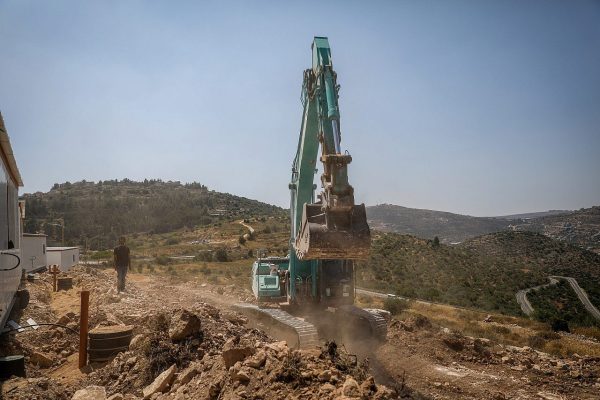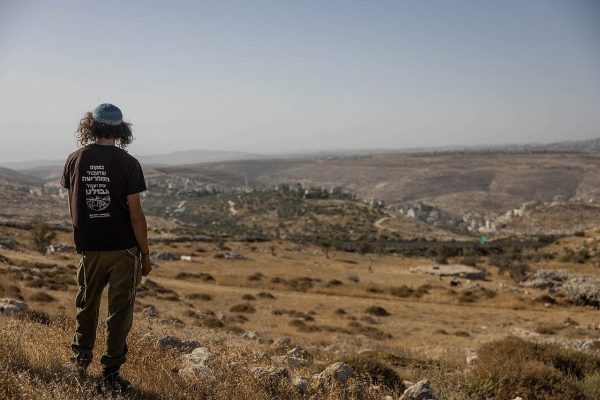The managing editor of Zo Haderech Assaf Talgam (center), addressed the People’s World 100th Birthday Celebration during the CPUSA’s 32nd National Convention in Chicago, June 7, 2024 (Photo: Taylor Dorrell / People’s World)
Reposted from the Communist Party of Israel
While this terrible situation is known to many around the world, almost none of it appears in mainstream Israeli media. Since the beginning of the war, all major media outlets in Israel, including all Hebrew language TV and radio stations and almost all newspapers, have completely ignored the atrocities perpetrated by the Israeli military in Gaza. Thus, large segments of the Israeli public remain ignorant of the crimes committed by their government.
As you know, the current assault on Gaza followed a massacre carried out by Hamas on October 7 against Israeli civilians in towns and villages bordering the Gaza strip. For many months after this terror attack, Israeli media coverage of the conflict focused almost exclusively on the crimes committed by Hamas, ignoring the ongoing developments. While the mainstream Israeli media was broadcasting the same images of the Hamas attack again and again, tens of thousands of Palestinians were killed in Gaza Israeli bombings.
The silence on war crimes in Gaza on behalf of the Israeli media is, of course, intentional. The collaboration of the media is critical for maintaining public support for the war. Mainstream media outlets do not try to keep the public informed, but rather misinformed about what is going on in Gaza. And this is actually the more moderate and respectable part of the Israeli media. Right wing elements like channel 14, known for its fanatical support for Netanyahu, are in fact actively celebrating the deaths of Palestinian civilians, while urging the military to commit more war crimes.
More recently, the Netanyahu government has cracked down on Al-Jazira, banning the network from working in Israel and the occupied territories because its broadcasts portrayed Israel in a negative light. The Israeli communications minister even went so far as to confiscate filming equipment from the AP agency, because they had sold footage to Al-Jazira. The equipment was later returned, as following the international backlash the government realized it had gone one step too far.
It is within this context that our newspaper now operates. Zo Haderech – which in Hebrew means “This path” – is a weekly published by the Israeli Communist Party since 1965. Alongside the Arabic-language Al-Ittihad (meaning “The Union”), which was founded in 1944, it is the main media outlet of the party. In addition to the printed editions, both newspapers also maintain active websites that are updated on a daily basis.
Zo Haderech is a relatively small publication. It was born out of necessity in 1965, after the rupture within the Israeli Communist party left the daily Hebrew language newspaper in the hands of a breakaway faction. Al-Ittihad, on the other hand, used to be the only Arabic language daily newspaper published within Israel, and for many years was also the most popular and widely read publication among the Palestinian-Arab citizens of Israel. It is still considered one of the leading Arabic language newspapers in Israel.
Since the beginning of the war, both communist newspapers have been struggling against the media silence, trying to bring the Israeli public news of the ongoing situation in Gaza. Since we cannot report directly from the warzone, we have been publishing information and reports from reliable Palestinian sources on the ground as well as international NGO’s and UN agencies working in the Gaza strip. Since the beginning of the war in October, our readership has greatly expanded as critical thinking Israeli citizens sought trustworthy information on what is really taking place.
In addition to our role in breaking the media silence on the war in Gaza, we have two further important political tasks: making dissenting voices inside Israel heard, and giving political direction to the anti-war movement. The Israeli Communist Party and its allies in Hadash, the democratic front for peace and equality, are the only political forces inside the country that have consistently opposed the war since its inception and have sought to rally public resistance.
We maintain that the war is a disaster for both Palestinians and Israelis. It exacts a terrible price in human life, destroying the Palestinian people, poisoning Israeli society and destroying the remnants of Israeli democracy. Therefore, we emphasize to the Israeli public: no people can base its future on the destruction of another; there can be no military solution to the Israeli-Palestinian conflict. The continuation of the war will not bring Israelis security, nor bring back the hostages taken by Hamas. These can only be liberated in the framework of an exchange deal, in which Israel will release Palestinian political prisoners in return for the hostages. It is clear that such an exchange can only take place once hostilities have ceased.
In the early days of the war, we were alone in saying this. Such arguments were seen by most Israeli Jews as detrimental to the war effort, bordering on treason and support for the enemy. However, in recent months political conditions have begun to shift. Tens of thousands inside Israel have been internally displaced following the Hamas attack in October and the ongoing conflict with Hizballah along the Israeli-Lebanese border. Following eight months of death and destruction in Gaza, the Netanyahu government has failed in achieving any of its stated war objectives, with the army still bogged down in Gaza and taking casualties; the Israeli economy is facing a recession; and the international pressure on the country is mounting. All these have started to make people more receptive to our anti-war message. Perhaps most important regarding the shift in public opinion is the humanitarian plight of the civilian hostages still being held by Hamas – especially since more and more evidence points out that many of the hostages have already been killed by the indiscriminate Israeli bombings.
As a result of all these causes, more and more Israelis are beginning to understand that the war serves only Netanyahu, his allies and the capitalist war profiteers.
But ending the war is only the first step for a stable and lasting peace. Even among those Israelis who have come to support ending the war, not all agree on the path to a viable, long-term solution. The Israeli Communist Party maintains that the only bases for a just and lasting peace are the end of Israel’s occupation of the Palestinian Territories it conquered in June 1967; the establishment of an independent Palestinian State with East Jerusalem as its capital, alongside the State of Israel; and a just solution to the question of the Palestinian refugees respecting their right of return. Zo Haderech and Al-Ittihad carry this message. As communists, it is our political role not only to protest and fight injustice, but to guide the way to change.
The inhumane war of destruction waged against the Palestinian people in Gaza is our most urgent political concern, but it is far from being the only one. In the occupied West Bank, Israeli settler violence against Palestinian villagers has reached unprecedented levels. Well-armed and organized settler gangs have been attacking Palestinian villages and shepherding communities, burning, looting and destroying property, often injuring or even killing Palestinians who stand in their way. Soldiers usually accompany these attacks, serving as armed escorts and standing idly by as the settlers commit their crimes. Our newspapers are among the only ones in Israel to report on these attacks, relying on the testimonies of local Palestinian communities, as well as on comrades who stay with these communities and try to protect them.
Inside Israel too, political struggles abound. In recent years, and particularly since the re-election of Netanyahu in 2022, Israel has been undergoing severe democratic backsliding. Netanyahu, facing several corruption and bribery charges, is set on dismantling legal checks and balances on his power. Before the war, the efforts of the government were concentrated on a judicial reform intended to nullify the authority of the supreme court. The proposed reform was deeply unpopular and ignited massive opposition demonstrations in the streets. The government was forced to withdraw, but the war has provided it with a suitable cover under which to continue these attempts. With the media attention concentrated on the war and the hostages, and the general atmosphere of crisis, the government faces less criticism and opposition when enacting its authoritarian policies.
One of the more dangerous developments in this context is the politization of the Israeli police under the influence of the far-right minister Ben Gvir. In recent months the police play an increasingly active part in political repression, serving the interests of the minister. This includes the use of violence to break up demonstrations; police raids against the headquarters of the Israeli communist party in Nazareth, supposedly protected under law; and the forcing of Arab-Bedouin citizens off their lands in the Negev desert and the destruction of their homes. This problem runs deeper than the appointment of a racist and religious fanatic as minister by Netanyahu. It is deeply troubling that many within the ranks of the police openly identify with the minister’s violent and repressive agenda. This is a result of the poisoning of Israeli society by decades of occupation in the Palestinian territories, as well as the discrimination and fueling of nationalist hatred toward Arab citizens of Israel.
Economically, the war constitutes a heavy burden on the Israeli economy. As always under capitalism, the first to pay the price are the poor and the workers. In order to finance the war, the government has cut social spending across the board. Price hikes have also become frequent, as trade has decreased and many businesses engage in war profiteering. Netanyahu’s neoliberal coalition wishes to place this economic burden squarely on the shoulders of the working class, while Israeli and foreign capital continues to make extraordinary profits.
In the face of these serious challenges, Zo Haderech and Al-Ittihad call for a united front of the Arab and Jewish workers. The Communist Party of Israel calls for the strengthening of the Jewish-Arab nature of the struggle for peace and social justice. Partnership in the struggle between Jews and Arabs is vital for the campaigns for social justice and the defense of democracy, for equality of civil rights, for national rights for the Arab-Palestinian national minority in Israel and against any manifestation of racism or discrimination.
On the international level, we wish to strengthen all peace-minded people around the world who are involved in the struggle against Israeli aggression and occupation, and salute those who act in solidarity with the Palestinian people and the peace forces inside Israel. Media outlets like People’s World, who regularly report on the developments in Israel-Palestine and carry the message of peace throughout the world, play an important role in this struggle. Your solidarity, comrades, is of vital importance. It is a major contribution to saving the peoples of Palestine and Israel from disaster.
Assaf Talgam, is the managing editor of the Communist Party of Israel weekly Zo Haderech, during an event sponsored by People’s World held in Chicago on last Friday night. Talgam participated in the 100th anniversary celebration of People’s World on behalf of Zo Haderech.















